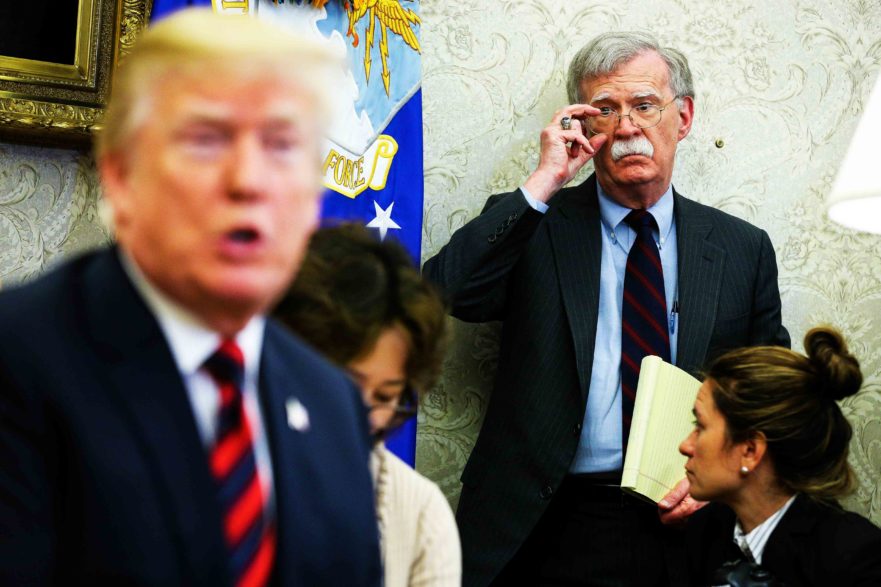Donald Trump speaks as National Security Advisor John Bolton listens during a meeting with South Korean President Moon Jae-in on May 22, 2018 in Washington, D.C. Photo by Oliver Contreras-Pool/Getty Images.
As the potential June 12 summit between President Trump and Kim Jong Un approaches, key personnel working under National Security Advisor John Bolton have maintained external affiliations with hawkish institutions that in the past opposed diplomatic engagement with North Korea—and that receive funding from defense contractors whose ability to market lucrative missile-defense products could benefit from continued hostile relations with the country.
Charles Kupperman, a longtime associate of Bolton, is overseeing the hiring process at the National Security Council as a senior advisor in a temporary capacity, according to the New York Times. A former vice president at both Boeing and Lockheed Martin, Kupperman previously worked in Bolton’s constellation of political organizations, serving as treasurer of Bolton’s PAC when he was exploring a 2016 presidential bid. Kupperman also worked in the Reagan Administration as a special assistant to the president.
Now back in an active federal government position, Kupperman is also a member of the board of directors for the National Institute for Public Policy, a Cold War–era think tank that was founded to promote militarist nuclear-armament strategy since the 1980s. A spokesperson for the Institute, Amy Joseph, confirmed that his status on the board is active.
Analysts associated with the Institute have published reports bemoaning Obama-era reductions in missile defense spending to contain the purported North Korean threat. Mark Schneider, a senior analyst for the Institute, issued a report in 2013 chastising Obama for emboldening North Korea with its “talk of nuclear disarmament.” (Trump has said that nuclear disarmament must be a component of any forthcoming peace agreement.) And Kenneth Payne, a co-founder of the Institute, has argued that diplomacy with North Korea is a “failure” and called on President Trump to counter Kim Jong Un by instead investing in expanding a missile-interceptor system developed by the defense contractor giant Raytheon.
Raytheon is also one of the Institute’s chief funders. If the purported threat posed by North Korea declines as a result of a peace agreement, so too could the need for spending on missile systems—which would be detrimental to Raytheon’s interests.
Though the Institute touts Raytheon as one of its premier funding sources, it does not name a specific monetary figure. As a nonprofit, the Institute is not required to disclose its funding sources.
Raytheon has trumpeted the benefits of increased spending on missile defense systems as a result of the purported North Korean threat. Since February 2017, when the State Department approved a $140 million missile sale to South Korea, industry analysts have labeled missile defense as an area ripe for expansion. “As a growth engine, international sales obviously helps us because it’s a growth path for the company,” Thadeous Smith, a Raytheon missile division head, told National Defense Magazine, an industry publication, after the sale’s approval. Prospects for continued “growth” looked promising throughout 2017, as Raytheon debuted the production of a missile-intercepting system called “Sky Hunter,” which is modeled on the Israeli “Iron Dome” system.
An outcome from the potential summit which results in decreased North Korean tensions could be bad for Raytheon’s business.
Raytheon’s stock price spiked last week after Trump sent a letter to Kim canceling the summit. Then, as reports emerged of renewed prospects that the summit could be held, the price sagged.
As its personnel demand a hawkish posture toward North Korea, National Institute for Public Policy has also regularly received funding from the federal government. The most recent reporting period showed that the Institute received $1.4 million in federal funds in fiscal year 2016, and the firm’s most recent available federal contract, for $337,495, was awarded in July 2017, days before one of its senior scholars, Mark Esper, was nominated to be Secretary of the Army. Following his tenure at the Institute, Esper worked as one of Raytheon’s top lobbyists.
Kupperman has an affiliation with another Bolton associate reportedly exerting influence over National Security Council issues, Matthew C. Freedman, who served as a deputy ambassador in the State Department when Bolton was acting U.N. Ambassador during the George W. Bush administration. Though he previously headed a global consulting firm, Davis, Manafort, & Freedman, Inc. (along with indicted former Trump campaign chairman Paul Manafort), Freedman no longer registers as a lobbyist; his consulting business, Global Impact, is incorporated in Virginia and does not file federal disclosure forms. Kupperman has a biography page on the Global Impact website, but it is not accessible through any links on the main page and his role with the firm is not specified.
Politico reported that Freedman has met with National Security Council job applicants, though unlike Kupperman, he does not have an official government position. Freedman appears to have made some recent adjustments to his public presentation. He previously boasted on the Global Impact website of having worked on an electoral campaign that helped promote the “rule of law” in South Korea. The claim no longer appears on the website.
Freedman did not respond to a message requesting comment. Kupperman could not be reached.
Michael Tracey is a staff reporter for TYT Investigates.
Don’t miss exclusive news stories from The Young Turks: Follow TYT Investigates on Twitter, Facebook, and YouTube.


Comments
The conflicts of interest in US government is ridiculous. How are conflicts of interest in government positions not illegal?